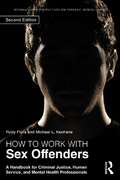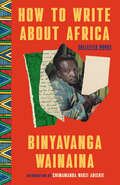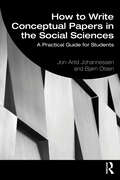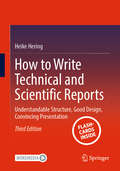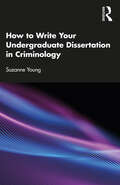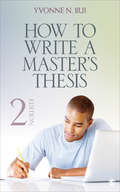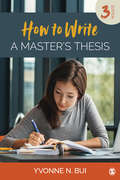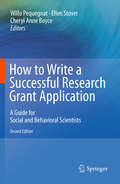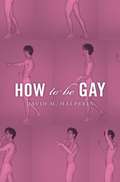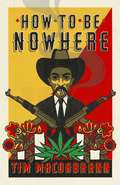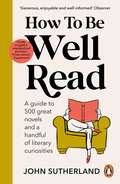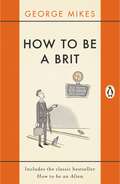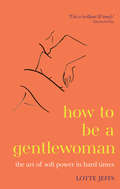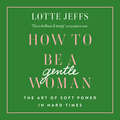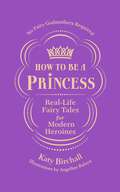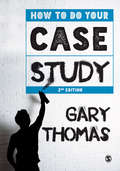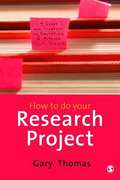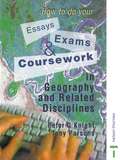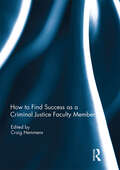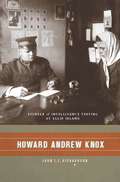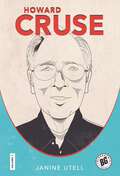- Table View
- List View
How to Work with Sex Offenders: A Handbook for Criminal Justice, Human Service, and Mental Health Professionals (International Perspectives on Forensic Mental Health)
by Rudy Flora Michael L. KeohaneHow to Work with Sex Offenders is a cutting edge, state-of-the-art book that provides mental health professionals best practice techniques on how to clinically evaluate, interview, and treat this challenging patient population. Successful models of individual, family, and group models of psychotherapy are provided for the reader. In addition, this handbook walks the reader through the investigation, arrest, prosecution and court hearing process, from start to finish. Thoroughly revised, this new edition builds on additional research data and new information, adding advanced chapters on female offenders, Internet offenders, pornography, sexual addiction, rape and child and adolescent sexual misconduct. This is a must-read work for undergraduate and graduate students, law enforcement officers, prosecutors, judges, child protection service workers, therapists, and other professionals who work with sex offenders.
How to Write About Africa: Collected Works
by Binyavanga WainainaFrom one of Africa&’s most influential and eloquent essayists, a posthumous collection that highlights his biting satire and subversive wisdom on topics from travel to cultural identity to sexuality&“A fierce literary talent . . . [Wainaina] shines a light on his continent without cliché.&”—The Guardian&“Africa is the only continent you can love—take advantage of this. . . . Africa is to be pitied, worshipped, or dominated. Whichever angle you take, be sure to leave the strong impression that without your intervention and your important book, Africa is doomed.&”Binyavanga Wainaina was a pioneering voice in African literature, an award-winning memoirist and essayist, and a gatherer of literary communities. Before his tragic death in 2019 at the age of forty-seven, he won the Caine Prize for African Writing and was named one of Time&’s 100 Most Influential People. His wildly popular essay &“How to Write About Africa,&” an incisive and unapologetic piece exposing the harmful and racist ways Western media depicts Africa with implicit bias and subjective clichés, changed the game for African writers and helped set the stage for a new generation of authors, from Chimamanda Ngozi Adichie to Yaa Gyasi. When Wainaina published a &“lost chapter&” of his 2011 memoir as an essay called &“I Am a Homosexual, Mum,&” which imagines coming out to his mother, he became a voice for the queer African community as well, adding a new layer to how African sexuality is perceived.How to Write About Africa collects these powerful pieces in a lively and imaginative set of essays about sexuality, art, history, and contemporary Africa. Wainaina&’s writing is playful, robust, generous, and full-bodied. He describes the modern world with sensual, emotional, and psychological detail, giving us a full-color view of a country and continent. These works present a portrait of a giant in African literature who left a tremendous legacy.
How to Write Conceptual Papers in the Social Sciences: A Practical Guide for Students
by Jon-Arild Johannessen Bjørn OlsenThis book is a practical guide on how to write conceptual papers and use conceptual generalization as a research methodology. Divided into two parts, the book first focuses on the scientific foundation for conceptual generalization, to identify what is a conceptual model and how conceptual models can be developed. Part two focuses on how to write a winning conceptual thesis, covering conceptual generalisation and empirical generalisation, and discusses research problems and questions, and how to analyse them. The authors cover different conceptual and analytical models to offer students a multitude of tools to visualize, interpret and uncover relationships and patterns. For example, they explore the thought experiment, analytical models, empirical causal models, analytical forms and data mining models, and outline a strategy for developing conceptual models to assist with students who wish to design their own conceptual paper. Students gain a clear understanding of the driving forces in the research process, how to define a research problem, how to analysis the problem and develop research strategies. Moving from concepts to hypotheses, the book also covers the main types of errors that may be encountered as students learn about understanding the development of models and how to develop a theory. Also including a checklist for students, and a list of definitions and concepts, this is the ideal resource for advanced undergraduate and postgraduate students, and researchers, in the social sciences.
How to Write Technical and Scientific Reports: Understandable Structure, Good Design, Convincing Presentation
by Heike HeringHow to Write Technical and Scientific Reports This textbook introduces all important and necessary knowledge to create written reports or oral presentations about STEM and engineering topics in a professional and efficient manner. By showing example structures and right/wrong comparisons you will get many practical hints on how to design your own report. The examples are mostly derived from works written by the authors and therefore they often deal with mechanical engineering topics. There are different sections about frequent mistakes in Technical and Scientific Reports, the use of word processors and tools for creating presentations, the design of figures and tables as well as the oral presentation of the Technical or Scientific Report, also as a short statement. In this 3rd edition all texts were revised and updated, the sections with references were updated, the glossary and index were expanded and Springer Nature (SN) Flashcards were added to help you to remember the introduced knowledge and to create Technical and Scientific Reports even more efficiently. Test your knowledge with questions and answers about the book with Springer Nature Flashcards.
How to Write Your Undergraduate Dissertation in Criminology
by Suzanne YoungThis book provides a guide for undergraduate criminology and criminal justice students undertaking their final-year dissertation. It speaks to the specific challenges for criminology students who may wish to research closed institutions (such as prisons, courts, or the police) or vulnerable populations (such as people with convictions, victims of crime, or young people), and offers guidance on how to undertake research on these topics whilet avoiding many of the access and ethical obstacles. It takes students through each phase of the dissertation, from designing and planning the research to writing up and presenting the completed work. The complexities of undertaking research on sensitive topics and with criminal justice institutions are discussed throughout, offering an insight into some of the challenges that students may be faced with and suggestions to overcome obstacles. It offers practical guidance for empirical and library-based projects and provides students with suggested resources for accessing primary and secondary data. It utilises a mixture of worked examples, top tips, practical strategies, and student activities to ensure the dissertation is a manageable and enjoyable process. This book will be beneficial to all undergraduate criminology students who have to undertake either a library-based or empirical dissertation. The examples and activities in the book will also be useful for dissertation supervisors who can use them to support their dissertation students.
How to Write a Master's Thesis
by Yvonne N. BuiYvonne N. Bui's How to Write a Master's Thesis is a step-by-step guidebook that demystifies a process that can often prove to be overwhelming and confusing to graduate students. The tone and format of this applied book is reader-friendly and includes practical suggestions that go beyond informing what "should" be done. It is chock full of detailed explanations, examples, and supplemental materials that have been used successfully in advising students in completing their master's theses.
How to Write a Master′s Thesis
by Yvonne N. Bui"This is the best textbook about writing an M.A. thesis available in the market." –Hsin-I Liu, University of the Incarnate Word The Third Edition of How to Write a Master′s Thesis is a comprehensive manual on how to plan and write a five-chapter master’s thesis, and a great resource for graduate students looking for concrete, applied guidance on how to successfully complete their master′s degrees. While research methods and statistics courses may teach students the basic information on how to conduct research, putting it all together into a single project and document can be a challenge. Author Yvonne Bui demystifies this process by integrating the language learned in prerequisite methods and statistics courses into a step-by-step guide for developing a student′s own thesis or project.
How to Write a Master′s Thesis
by Yvonne N. Bui"This is the best textbook about writing an M.A. thesis available in the market." –Hsin-I Liu, University of the Incarnate Word The Third Edition of How to Write a Master′s Thesis is a comprehensive manual on how to plan and write a five-chapter master’s thesis, and a great resource for graduate students looking for concrete, applied guidance on how to successfully complete their master′s degrees. While research methods and statistics courses may teach students the basic information on how to conduct research, putting it all together into a single project and document can be a challenge. Author Yvonne Bui demystifies this process by integrating the language learned in prerequisite methods and statistics courses into a step-by-step guide for developing a student′s own thesis or project.
How to Write a Successful Research Grant Application
by Willo Pequegnat Ellen Stover Cheryl Anne BoyceOver the last fifty years behavioral and medical research has been generously supported by the federal government, private foundations, and other philanthropic organizations contributing to the development of a vibrant public health system both in the United States and worldwide. However, these funds are dwindling and to stay competitive, investigators must understand the funding environment and know how to translate their hypotheses into research grant applications that reviewers evaluate as having scientific merit. The Second Edition of 'How to Write a Successful Research Grant Application' is the only book of its kind written by federal research investigators which provides technical assistance for researchers applying for biobehavioral and psychosocial research funding and can give them an edge in this competitive environment. The book provides invaluable tips on all aspects of the art of grantsmanship, including: how to determine research opportunities and priorities, how to develop the different elements of an application, how to negotiate the electronic submission and review processes, and how to disseminate the findings. Charts, visual aids, Web links, an extensive real-world example of a research proposal with budget, and a "So You Were Awarded Your Grant--Now What?" chapter show prospective applicants how to: - Formulate a testworthy--and interesting--hypothesis. - Select the appropriate research mechanism. - Avoid common pitfalls in proposal writing. - Develop an adequate control group. - Conduct a rigorous qualitative inquiry. - Develop a budget justification of costs. - Develop a human subjects of animal welfare plan. - Write a data analytic plan. - Design a quality control/assurance program. - Read between the lines of a summary of the review of your application. Although its focus is on Public Health Service funding, 'How to Write a Successful Research Grant' is equally useful for all research proposals, including graduate students preparing a thesis or dissertation proposal. Service providers in community-based organizations and public health agencies will also find this a useful resource in preparing a proposal to compete for grant funds from state and community resources, non-government organizations, and foundations.
How to be Gay
by David M. HalperinNo one raises an eyebrow if you suggest that a guy who arranges his furniture just so, rolls his eyes in exaggerated disbelief, likes techno music or show tunes, and knows all of Bette Davis's best lines by heart might, just possibly, be gay. But if you assert that male homosexuality is a cultural practice, expressive of a unique subjectivity and a distinctive relation to mainstream society, people will immediately protest. Such an idea, they will say, is just a stereotype-ridiculously simplistic, politically irresponsible, and morally suspect. The world acknowledges gay male culture as a fact but denies it as a truth. David Halperin, a pioneer of LGBTQ studies, dares to suggest that gayness is a specific way of being that gay men must learn from one another in order to become who they are. Inspired by the notorious undergraduate course of the same title that Halperin taught at the University of Michigan, provoking cries of outrage from both the right-wing media and the gay press, How To Be Gay traces gay men's cultural difference to the social meaning of style. Far from being deterred by stereotypes, Halperin concludes that the genius of gay culture resides in some of its most despised features: its aestheticism, snobbery, melodrama, adoration of glamour, caricatures of women, and obsession with mothers. The insights, impertinence, and unfazed critical intelligence displayed by gay culture, Halperin argues, have much to offer the heterosexual mainstream.
How to be Nowhere
by Tim MacGabhannLife is finally on the right track for reporter and recovering addict Andrew: he is slowly coming to terms with the murder of his photographer boyfriend Carlos, pursuing sobriety and building a new home with a new partner. Andrew has almost forgotten about the story that ruined his life - but that story hasn't forgotten about him, and a series of deadly threats forces him into helping the very man whose gang murdered his boyfriend and left him homeless.A literary take on the classic chase movie, HOW TO BE NOWHERE is the sequel to Tim MacGabhann's genre-busting and critically-acclaimed debut CALL HIM MINE, and a blistering thrill-ride deep into the fog of Central America's murky present and tragic future.
How to be Nowhere
by Tim MacGabhannLife is finally on the right track for reporter and recovering addict Andrew: he is slowly coming to terms with the murder of his photographer boyfriend Carlos, pursuing sobriety and building a new home with a new partner. Andrew has almost forgotten about the story that ruined his life - but that story hasn't forgotten about him, and a series of deadly threats forces him into helping the very man whose gang murdered his boyfriend and left him homeless.A literary take on the classic chase movie, HOW TO BE NOWHERE is the sequel to Tim MacGabhann's genre-busting and critically-acclaimed debut CALL HIM MINE, and a blistering thrill-ride deep into the fog of Central America's murky present and tragic future.
How to be Well Read: A guide to 500 great novels and a handful of literary curiosities
by John Sutherland'Generous, enjoyable and well informed.' Observer'500 expertly potted plots and personal comments on a wide range of pop and proper prose fiction.' The Times___________________________________________________________Ranging all the way from Aaron's Rod to Zuleika Dobson, via The Devil Rides Out and Middlemarch, literary connoisseur and sleuth John Sutherland offers his very personal guide to the most rewarding, most remarkable and, on occasion, most shamelessly enjoyable works of fiction ever written.He brilliantly captures the flavour of each work and assesses its relative merits and demerits. He shows how it fits into a broader context and he offers endless snippets of intriguing information: did you know, for example, that the Nazis banned Bambi or that William Faulkner wrote As I Lay Dying on an upturned wheelbarrow; that Voltaire completed Candide in three days, or that Anna Sewell was paid £20 for Black Beauty? It is also effectively a history of the novel in 500 or so wittily informative, bite-sized pieces.Encyclopaedic and entertaining by turns, this is a wonderful dip-in book, whose opinions will inform and on occasion, no doubt, infuriate.__________________________________________________'Anyone hooked on fiction should be warned: this book will feed your addiction.' Mail on Sunday'A dazzling array of genres, periods, styles and tastes... chatty, insightful, unprejudiced (but not uncritical) and wise.' Times Literary Supplement
How to be a Brit: The hilariously accurate, witty and indispensable manual for everyone longing to attain True Britishness
by George MikesThe hilariously accurate, witty and indispensable manual for everyone who longs to attain True Britishness'Got me in tears of laughter' 5***** Reader Review'Laugh-out-loud hilarious, witty and insightful' 5***** Reader Review_______Born in Hungary, George Mikes eventually spent more than forty years in the Britain observing behaviours and misbehaviours of local and foreign Brits.With essential chapters such as "How to Avoid Travelling", "On Shopping", "In Praise of Television", "On Not Complaining" and "How to Panic Quietly", you'll get to know Britain like never before. Loved by readers and authors alike, How to Be a Brit contains Mikes's three major works -- How to be an Alien, How to be Inimitable and How to be Decadent.If you're British, you'll love it; if you're a foreigner, you'll appreciate it. Queuing: "An Englishman, even if he is alone, forms an orderly queue of one." How to plan a town: "Street names should be painted clearly and distinctly on large boards. Then hide these boards carefully." Sex: "Continental people have sex lives: the English have hot water bottles."George Mikes's perceptive bestseller provides a complete guide to the British Way of Life._______'Hilarious and informative essays about the British way of life' 5***** Reader Review'So many people have tried to describe the English mentality . . . This book is as near as you can get!' 5***** Reader Review
How to be a Gentlewoman: The Art of Soft Power in Hard Times
by Lotte Jeffs*'This is brilliant and timely' Elizabeth Day'Part memoir, part manual - this is the type of book every modern woman can take something from' GraziaLearn to navigate the harshness of life with soft power. In her debut book, Lotte Jeffs weaves powerful life experience with practical advice and a psychological deep-dive into what truly constitutes an emotionally rich and meaningful existence. She speaks to everyone from agony aunts and archaeologists, to pop stars and novelists, to explore a diverse picture of what it is to truly live life well.How to be a Gentlewoman will teach you how to slow down, lean out, recognize good relationships and let go of the bad, create a space you love, find your people and construct a happy and 'joined up' sense of yourself.The gentle antidote to a brutal world.For fans of Dolly Alderton's Everything I Know About Love and Elizabeth Day's How to Fail.
How to be a Gentlewoman: The Art of Soft Power in Hard Times
by Lotte Jeffs'This is brilliant and timely' Elizabeth Day'Part memoir, part manual - this is the type of book every modern woman can take something from' GraziaLearn to navigate the harshness of life with soft power. In her debut book, Lotte Jeffs weaves powerful life experience with practical advice and a psychological deep-dive into what truly constitutes an emotionally rich and meaningful existence. She speaks to everyone from agony aunts and archaeologists, to pop stars and novelists, to explore a diverse picture of what it is to truly live life well.How to be a Gentlewoman will teach you how to slow down, lean out, recognize good relationships and let go of the bad, create a space you love, find your people and construct a happy and 'joined up' sense of yourself.The gentle antidote to a brutal world.For fans of Dolly Alderton's Everything I Know About Love and Elizabeth Day's How to Fail.
How to be a Gentlewoman: The Art of Soft Power in Hard Times
by Lotte Jeffs*'This is brilliant and timely' Elizabeth Day'Part memoir, part manual - this is the type of book every modern woman can take something from' GraziaLearn to navigate the harshness of life with soft power. In her debut book, Lotte Jeffs weaves powerful life experience with practical advice and a psychological deep-dive into what truly constitutes an emotionally rich and meaningful existence. She speaks to everyone from agony aunts and archaeologists, to pop stars and novelists, to explore a diverse picture of what it is to truly live life well.How to be a Gentlewoman will teach you how to slow down, lean out, recognize good relationships and let go of the bad, create a space you love, find your people and construct a happy and 'joined up' sense of yourself.The gentle antidote to a brutal world.For fans of Dolly Alderton's Everything I Know About Love and Elizabeth Day's How to Fail.
How to be a Global Citizen: Be Informed. Get Involved.
by DKBe the change in your community! This illustrated guide takes you through challenges the world is facing and how you and your kids can help overcome them. Aspiring activists and young community leaders need information and tools to be responsible citizens and changemakers in their communities. This activism book is packed with content that will both educate and challenge young children aged 11+ years to make a difference.How to be a Global Citizen covers topics such as politics and voting, how to be responsible with online communication, preventing unfair discrimination, and protecting our environment. You&’ll find: • Creative illustrations and clear text simplify challenging topics • Advice for parents and teachers on explaining tricky social and environmental issues to children • Steps to contribute to society at an individual level • Features on inspirational young role models leading the charge on different causes around the world Inspire youth with tales of their peersYoung people are leading movements around the world, influencing their communities, and illuminating issues that have plagued our societies for far too long. Each chapter of How to be a Global Citizen provides information and ideas on how children can have important conversations amongst friends, family, and the wider community to affect change. Children are inspired by the stories of young leaders such as LGBTQ+ rights activist, Jazz Jennings, and environmentalist, Greta Thunberg. And each of their stories serves to be an example of what it means to be a responsible citizen, how to make the world a better place, and how to care for our societies and environment. Other titles to Help Your Kids DK&’s Help Your Kids series is aimed at young readers ages 11 + years, parents, and teachers. These books are an excellent resource to help children understand complex topics. Other books in this series include Help Your Kids with English, Help Your Kids with Study Skills, and Help Your Kids with Dyslexia.
How to be a Princess: Real-Life Fairy Tales for Modern Heroines – No Fairy Godmothers Required
by Katy BirchallAs Meghan Markle once said: 'With fame comes opportunity, but it also includes responsibility - to advocate and share, to focus less on the glass slipper and more on pushing through glass ceilings. And, if I'm lucky enough, to inspire.'Inspired by the Royal Wedding on 19 May, this beautiful collection of light-hearted stories celebrates what it takes to be a modern princess. Smart, strong, kind and brave, every princess here - whether they be fictional or real - is awesome.Including: Meghan, Ameera, Elizabeth II, Elsa, Leia, Moana, Tiana, Fiona, Haya, Lalla, Akishino, Maha, Diana, Catherine, Grace, Maxima, Rania AND princesses ahead of their time: Margaret, Elizabeth I, Pingyang, Hatshepsut, Nzinga and Seondeok.This book will make you smile and inspire you to make your own happy ending.
How to do Your Case Study
by Gary ThomasThis accessible text introduces students and researchers to the basics of case study research, using a wide range of real-life examples. It deals with the core issues and methods that anyone new to case study will need to understand: What is a case study? When and why should case study methods be used? How are case studies designed? What methods can be used? How do we analyze our data and write up our case?
How to do Your Research Project: A Guide for Students in Education and Applied Social Sciences
by Gary ThomasAre you doing a research project? Do you need advice on how to carry out research? Does writer's block get in the way of your dissertation?<P><P> Nearly all students need to do a research project at some point during their degree. How to do your Research Project guides you through the different phases of doing so. With practical examples, Thomas explains what should happen at each project phase, detailing the main design frames and methods used in social science research, and providing down to earth and practical advice on weaving these elements together into a coherent whole.
How to do your Essays, Exams and Coursework in Geography and Related Disciplines
by Tony Parsons Peter KnightWritten for students who need help doing their coursework and exams, this book focuses mainly on the skills and techniques that apply to essay writing, but also covers other types of assignment such as posters, talks, PowerPoint^DTM presentations and web pages. Its basis is that all of these different types of work are centred on clear communication of well-supported responses to the questions or tasks that have been set.
How to find success as a Criminal Justice faculty member
by Craig HemmensProfessional development is an issue of interest to all criminal justice faculty, from the newest Assistant Professor to the most senior Full Professor. The annual Academy of Criminal Justice Sciences conference has a number of panels and workshops that deal with the wide variety of issues that criminal justice faculty deal with as they move though their career. These panels are well-attended, attesting to the interest that faculty have in this topic. Given the importance of staying apprised of changes in the discipline, from hiring expectations to tenure and promotion requirements, the fact that academic study of criminal justice has changed a great deal in the past decade, and that more is now expected of graduate students, pre-tenure faculty, and even senior faculty, this book is an attempt to address some of the most important topics that those engaged in the academic study of criminal justice are faced with as they move through their career. Each chapter is written by a well-regarded academic with experience in the area upon which they are writing. This book was originally published as a special issue of the Journal of Criminal Justice Education.
Howard Andrew Knox
by John T. E. RichardsonHoward Andrew Knox (1885-1949) served as assistant surgeon at Ellis Island during the 1910s, administering a range of verbal and nonverbal tests for the mental capacity of potential immigrants. An early proponent of nonverbal intelligence testing (largely through the use of formboards and picture puzzles), Knox developed an evaluative approach that informs the techniques of practitioners and researchers today. Whether adapted to measure intelligence and performance in children, military recruits, neurological and psychiatric patients, or the average job applicant, Knox's pioneering methods deserve in-depth investigation that situates his discoveries within contemporary psychological practice. Completing the first biography of this unjustly overlooked figure, John T. E. Richardson, former president of the International Society for the History of the Neurosciences, takes stock of Knox's understanding of intelligence and his legacy beyond Ellis Island. Consulting published and unpublished sources, Richardson establishes a chronology of Knox's life, including details of his medical training and his time as a physician with the U. S. Army. He describes the conditions that gave rise to intelligence testing, including public concern that the mentally unfit were allowed to settle within the country. He then recounts the development of intelligence tests by Knox and his colleagues and the publication of their research, which captured the attention of a nation. These publications present a useful and extremely human portrait of psychological testing and its limits, particularly regarding the predicament of the people who were examined at Ellis Island. Richardson concludes with the continuation of Knox's work and its changing application in conjunction with modern psychological theory.
Howard Cruse (Biographix #1)
by Janine UtellHoward Cruse tells the life story of one of the most important figures in LGBTQ+ comics. A preacher’s kid from Alabama who became “the godfather of queer comics,” Cruse (1944–2019) was a groundbreaking underground cartoonist, a wicked satirist, an LGBTQ+ activist, and a mentor to a vast network of queer comics artists. His comic strip Wendel, published in The Advocate throughout the 1980s, is considered a revolutionary moment in the development of LGBTQ+ comics, as is his inaugurating the editorship of Gay Comix with Kitchen Sink Press in 1979, which furthered the careers of important artists like Jennifer Camper and Alison Bechdel. Cruse’s graphic novel Stuck Rubber Baby, published in 1995, fictionalizes his own coming out in the context of the civil rights movement in 1960s Birmingham and was a significant forerunner to contemporary graphic novels and memoirs. Howard Cruse draws on extensive archival research and interviews and covers Cruse’s entire body of work: the cute and zany Barefootz, the unexpected innovations of the Gay Comix stories, the domestic intimacies of Wendel, and the complexity and power of Stuck Rubber Baby. The book places Cruse’s art in the context of his life and his times, including the historic movements for gay rights and against the AIDS crisis, and it celebrates this extraordinary and essential figure of LGBTQ+ comics and American comics art more broadly.
